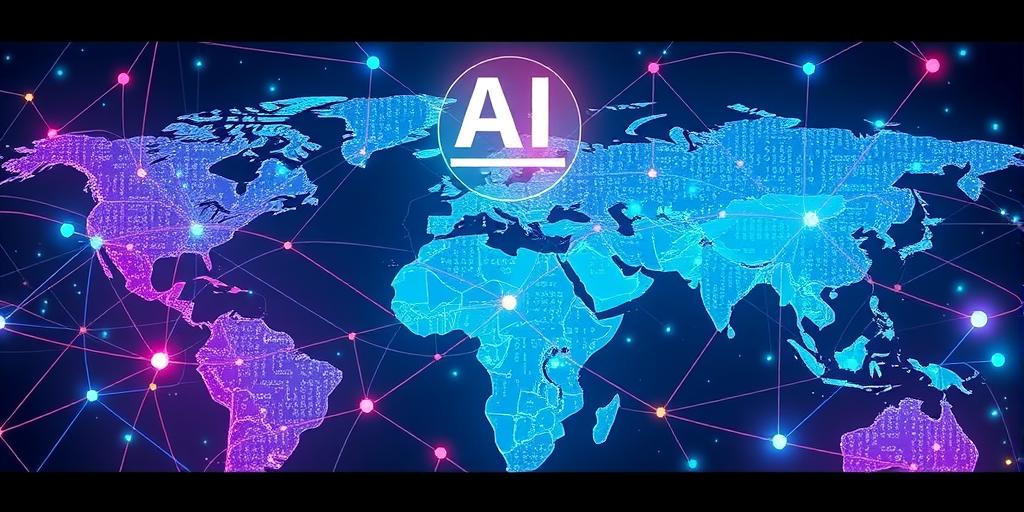Prepare to be amazed! Artificial intelligence (AI) is no longer a futuristic fantasy; it’s rapidly transforming global markets, creating both immense opportunities and unprecedented challenges. This isn’t just another tech trend; it’s a seismic shift that’s rewriting the rules of the economic game. From automating mundane tasks to powering cutting-edge innovations, AI’s economic impact is profound and far-reaching, impacting everything from job markets to international trade. Let’s dive deep into the heart of this technological revolution and uncover its complex influence on our global economy.
AI: The Engine of Economic Transformation
The economic influence of AI is nothing short of revolutionary. It’s not just about increased efficiency and productivity; it’s about creating entirely new industries and business models. AI-powered automation is streamlining operations across various sectors, from manufacturing and logistics to customer service and finance, resulting in significant cost reductions and increased output. This increased productivity fuels economic growth and fosters innovation, creating a ripple effect throughout the global economy. But this isn’t a simple story of unadulterated progress. The impact of AI on jobs, for example, requires careful consideration, with potential job displacement necessitating proactive measures for workforce retraining and adaptation. The implications for global trade are also significant, with the rise of AI potentially reshaping supply chains and competitive landscapes. The speed of technological advancements in artificial intelligence and machine learning is staggering, and it’s important to understand both the opportunities and the challenges this technology presents.
Automation and Productivity Gains
AI-driven automation is leading to significant productivity gains across industries. Businesses are leveraging AI to optimize their processes, reduce operational costs, and enhance output. This includes tasks like predictive maintenance in manufacturing, automated customer support, and algorithmic trading in finance. These improvements are leading to significant economic benefits, making businesses more efficient and competitive. Moreover, the integration of AI in various sectors is spurring innovation, leading to the development of entirely new products and services that were previously unimaginable. The future of the global economy is intricately linked to the development and implementation of effective AI technologies.
The AI-Driven Job Market
The impact of AI on the job market is a complex and hotly debated issue. While AI-driven automation does displace some jobs, it also creates new ones. The demand for AI specialists, data scientists, and other professionals with AI-related skills is rapidly growing. However, there’s also a need for proactive measures to address the potential for job displacement in other sectors. This necessitates a focus on workforce retraining and upskilling initiatives to prepare the workforce for the changing demands of the AI-driven economy. Successful navigation of this shift will require collaborative efforts between governments, businesses, and educational institutions. The proactive and thoughtful adaptation to the new technological landscape is a key factor for the successful economic impact of AI.
Navigating the Challenges of AI Adoption
Despite the immense potential of AI, its adoption presents several significant challenges. One key concern is the ethical implications of AI, particularly in areas like algorithmic bias and data privacy. Ensuring responsible AI development and deployment is paramount to mitigate these risks and foster public trust. Furthermore, the high cost of AI implementation can be a barrier for smaller businesses and developing economies. Bridging the technological gap requires international cooperation and investment in infrastructure and education. Global collaboration is crucial for harnessing AI’s potential for good and avoiding the potential pitfalls. This is not merely a technological challenge; it is a social and economic one, with global implications.
Ethical Considerations and Responsible AI
Responsible AI development and deployment is critical for maximizing its benefits while mitigating potential harms. This includes addressing concerns about algorithmic bias, ensuring data privacy, and promoting transparency in AI systems. The lack of regulation and standards can lead to the development and deployment of AI systems that perpetuate existing inequalities or cause unforeseen harm. Strong ethical guidelines and regulations are essential to ensure the responsible development and use of AI across all sectors. This responsibility extends to all stakeholders, including researchers, developers, policymakers, and users of AI technology. Without addressing these ethical concerns, the economic benefits of AI could be severely compromised.
The Digital Divide and Economic Inequality
The uneven distribution of AI’s benefits poses a risk of exacerbating existing economic inequalities. Developed countries and large corporations have a significant advantage in adopting and leveraging AI technologies, leaving behind smaller businesses and developing economies. Bridging this digital divide requires international cooperation to foster technological development and knowledge sharing. This includes investing in infrastructure, education, and capacity-building initiatives in developing countries to ensure that they can participate in the AI-driven economy. The global community must actively address the risk of marginalization and ensure that the benefits of AI are shared more equitably. Only through active participation and commitment can this gap be closed.
The Future of AI and the Global Economy
The future of the global economy will be profoundly shaped by the continued development and adoption of AI. While challenges exist, the potential benefits are enormous. By addressing ethical considerations, promoting responsible AI development, and bridging the digital divide, we can harness AI’s power to drive economic growth, create jobs, and improve living standards worldwide. This requires a concerted global effort involving governments, businesses, and individuals to shape the future of AI in a way that benefits all of humanity. The collaborative efforts will pave the way for an AI-powered future that promotes a fairer, more sustainable, and prosperous global economy for generations to come.
The transformative power of AI is undeniable. Don’t be left behind! Start exploring how AI can revolutionize your business and prepare for the future of work, today!




